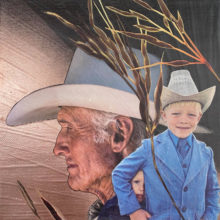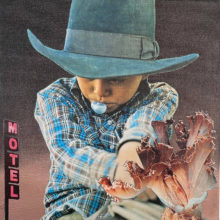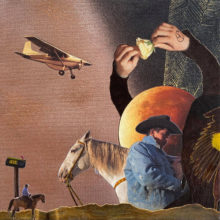
Vanessa Compton – 2020 Brinton 101
 Drawn to rural environments where landscapes are vast and people are few, Vanessa Compton grew up in northern Vermont where her singer-songwriter father and artist mother inspired her to create from an early age. She devoted her school years to theater, sculpture, cello and world music. Vanessa has lived in Dakar, Senegal studying the kora and its influence on hip hop music, and Kumasi, Ghana learning palm wine guitar with living master Koo Nimo. After falling in love with rock climbing, she moved to Colorado and graduated with a Bachelor of Fine Arts from CU-Boulder. Her sculptures and collages have been exhibited in galleries across the US and appear in private collections around the world. She has been awarded fellowships from The Wallace Stegner House, Vermont Studio Center, Hubbell Trading Post & National Historic Site, The Brush Creek Foundation, and Jentel Arts. Currently, Vanessa maintains a semi-nomadic lifestyle, creating art throughout the American West and the Northeast Kingdom of Vermont.
Drawn to rural environments where landscapes are vast and people are few, Vanessa Compton grew up in northern Vermont where her singer-songwriter father and artist mother inspired her to create from an early age. She devoted her school years to theater, sculpture, cello and world music. Vanessa has lived in Dakar, Senegal studying the kora and its influence on hip hop music, and Kumasi, Ghana learning palm wine guitar with living master Koo Nimo. After falling in love with rock climbing, she moved to Colorado and graduated with a Bachelor of Fine Arts from CU-Boulder. Her sculptures and collages have been exhibited in galleries across the US and appear in private collections around the world. She has been awarded fellowships from The Wallace Stegner House, Vermont Studio Center, Hubbell Trading Post & National Historic Site, The Brush Creek Foundation, and Jentel Arts. Currently, Vanessa maintains a semi-nomadic lifestyle, creating art throughout the American West and the Northeast Kingdom of Vermont.
“Sourced images of cowboys, cacti, craggy rock formations and other iterations of the western visual vernacular feature heavily in my mixed media collages. These oft-romanticized icons of Americana can reflect a darker side of our nation’s past and its reverberations into the present. Considering the ways in which my personal story is informed by a historical narrative of settler- colonialism, institutionalized racism and normalized toxic masculinity, my most recent collages address themes of social justice through the lenses of my own gender identity, whiteness, and implicit personal privilege.
Central to my current process is the overarching question: “Who gets to tell whose story?” An open-ended exploration of identity and authenticity, my latest work attempts to remind the viewer of the power of intentional imagery – particularly that of negative imagery – to influence perceptions of oneself and others. Reflecting on the ways in which I have benefitted from systems of oppression as a white, cis-gendered woman, I believe that addressing our blind spots, however uncomfortable, is a critical step in moving the needle towards social justice. I do believe that in accountability lies a possibility for positive change.” Vanessa Compton


